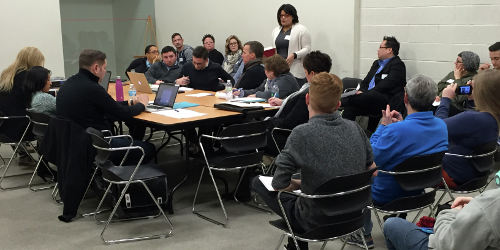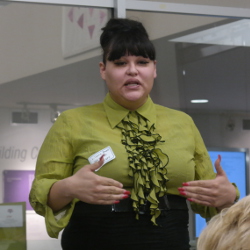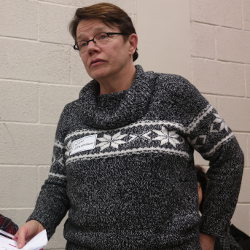BY AJ TRAGER

Liz Lamoste, standing, is a long-time supporter of the center. She called on the board to show more organizational transparency by providing the public with access to Affirmations bylaws and other documents including financial reports. In addition, she would also like to see a change in the demographics of the board.
 Youth Program Manager, Lilianna Reyes, believes that despite all the changes in staff and program management, Affirmations is still a place of active inclusion. "For Affirmations to see who I am as a person, then to see my skill and to grow that and allow me to have a true voice," Reyes explained. "I have a real voice at Affirmations; I'm not a token. I really make change for LGBT people of color and for youth."
Youth Program Manager, Lilianna Reyes, believes that despite all the changes in staff and program management, Affirmations is still a place of active inclusion. "For Affirmations to see who I am as a person, then to see my skill and to grow that and allow me to have a true voice," Reyes explained. "I have a real voice at Affirmations; I'm not a token. I really make change for LGBT people of color and for youth." FERNDALE – Approximately 30 community members came out to the Jan. 27 Affirmations Board of Directors meeting to share their current worries and concerns over board leadership and the direction the center is taking. It was one of the largest community turnouts the board has seen in some time.
Over the past year the center has gone through a lot of changes, including hiring former Executive Director Darrious Hilmon, who stepped down after just eight months on the job. The past year also saw major staff turnover both before and after Hilmon arrived. And just before the end of 2015, Affirmations announced the termination of its longest program, the Helpline. The move disappointed many individuals in the LGBT community who, as a result, have called for stronger leadership and more transparency from the organization. The latest board meeting provided a highly accommodating platform for the community to share its concerns.
After a brief presentation on the closing of the Helpline by Lydia Ahlum Hanson, director of programs at Affirmations, the board meeting shifted over to public comment.
 Affirmations first executive director, Jan Stevenson brought historical context to the discussion and told new executive director, Susan Erspamer, "I also know that when you make a mistake in that seat, sometimes it can feel like people are not very forgiving." Talking directly to Erspamer, Stevenson said, "I really appreciate that you had the courage to make the change and that you made the changes that you did."
Affirmations first executive director, Jan Stevenson brought historical context to the discussion and told new executive director, Susan Erspamer, "I also know that when you make a mistake in that seat, sometimes it can feel like people are not very forgiving." Talking directly to Erspamer, Stevenson said, "I really appreciate that you had the courage to make the change and that you made the changes that you did."Request For Transparency
First to speak before the body was Liz Lamoste. Lamoste, a long-time supporter of the center who outlined her concerns for the center in a recent op-ed published in BTL, called on the board to show more organizational transparency by providing the public with access to Affirmations' bylaws and other documents including financial reports. In addition, she would also like to see a change in the demographics of the board.
"In terms of not only synthesizing feedback, but systematically giving it some power, I think it is worth it to contemplate. And maybe this is already happening in board nominations that are taking place, but room for additional diversity both in terms of age, race, all gender orientations and socioeconomic status for board participation — either for participation in governing the board or creating some kind of community advisory council. All these comments were made with increasing transparency and community focus in mind," Lamoste said.
Tyler Beltz, former Affirmations peer educator, who also served as an intern for former executive director Hilmon, spoke directly to the needs of youth who utilize the center. Beltz called for more fair and open leadership in the organization and for Affirmations to provide the youth with an opportunity to share their voices and experiences.
"I grew up in a community where residents joined hands to create strong systems and safeguards ensuring that no one person slipped through the crisis cracks. I grew up in a community where voices offering progress or dissent were heard and respected, even considered. I knew of a community where mentorship was a torch passed on from one group of community leaders to another. And I learned to love a community where positive changes were welcomed, not dismissed. Despite this dynamic history, over the past few years I have witnessed and personally experienced a decline in these core values," Beltz said.
He went on to discuss a situation when he came to Affirmations looking for a safe space and instead experienced harassment from his LGBT peers.
Affirmations donor George Westerman questioned where the vision of the center was and where the donor money, including his money, was being allocated to.
"I am sad because I am wondering what Affirmations has to offer me anymore. It's sad for me because I have put in an investment of time and money to the organization and my concern is that the organization has become less transparent," he said.
The Helpline
Many community members including Michelle Fox-Phillips and Bill Hagel discussed their concerns over the closing of the Helpline and how they felt the program was a crucial service to the metro Detroit LGBT community. Fox-Phillips was concerned that for those calling the Helpline in a crisis, being rerouted to another organization could do more harm than good and that the Helpline was directly needed to assist in those crisis calls.
The Helpline was receiving 20 calls a week before its closure, though a good number of those calls were hang ups or callers searching for "sexy talk" rather than access to LGBT resources. The Helpline number will still be available and routed through Affirmations in 2016, but now callers are prompted with an extension that will link them to a list of services.
Jan Stevenson, the first executive director of Affirmations and current co-publisher of BTL, remembered a time when the Helpline would serve 800 calls a month ranging from "sexy talk" callers to individuals seeking crucial help.
"Times change. So does technology," Stevenson said to the room. "It makes sense to me that if you're only getting 20 calls a week, that it makes sense to reallocate resources to something that would be more technologically reasonable. That doesn't mean that every single person that needs help is going to be able to get it as they need it. You aren't gods."
Tensions Over Executive Director Discussed
Stevenson went on to describe the current climate at Affirmations and the seemingly tumultuous energy surrounding the center. Newly hired Executive Director Susan Erspamer had recently been involved in a controversial custody battle with her ex partner. Many within the LGBT community reacted negatively to Erspamer's original decision to argue a precedent that has been used against members of the gay community. Erspamer has since changed her position, legal counsel and legal strategy moving forward in the case.
Stevenson said, "I know the organization has gone through a lot in the last couple of years. And I sat in the executive director chair for awhile. I did my time, you know. I know it is really hard to sit in this chair. It is a very public place to be. Some days I would walk around and felt like I had a target on me and I also know that when you make a mistake in that seat, sometimes it can feel like people are not very forgiving. Talking directly to Erspamer, Stevenson said, "I really appreciate that you had the courage to make the change and that you made the changes that you did."
Response from Affirmations
In response to the community dialogue, Board President Frank Aiello asked the community to have patience as the board tries to stabilize and promised that the concerns that were discussed will be addressed quickly by the board.
"As the board chair I take very particularly to heart the comments about transparency. That is a place that we certainly can improve, not by way of excuse — capacity has been a challenge," he said.
Youth Program Manager, Lilianna Reyes, believes that despite all the changes in staff and program management, Affirmations is still a place of active inclusion. Through her leadership, a small number of qualified and motivated youth have benefited from the Youth Workforce Development Program where they have learned necessary skills to navigate the workforce. The first program was completed with a 100 percent retention rate and is expanding to provide training for 30 more youth in the city.
"As a trans person of color, I support Affirmations because it supports me," she said.
Reyes holds a master's degree and openly discussed her experience in workplace discrimination.
"For Affirmations to see who I am as a person, then to see my skill and to grow that and allow me to have a true voice," Reyes explained. "I have a real voice at Affirmations; I'm not a token. I really make change for LGBT people of color and for youth."
After many community participants left, Erspamer spoke to the board, as per the meeting agenda. Along with reacting to the community comments, she also outlined some of what the center plans to do in 2016. Erspamer announced that an annual report would be starting in 2016 and soon they will begin a strategic three-year plan, including a new brand designed by students from the Center for Creative Studies.
"I am very glad that the community has shown up to this meeting and I am excited to meet you all," she began. "I have been listening to everything you have been saying, and I have been taking notes. As far as transparency, I strongly believe the organization needs to have transparency and it needs to start with me."
Call to Action
A volunteer sheet circulated during the meeting for individuals to sign up and be a part of the Affirmations' volunteer staff.
The board also reminded the audience that there are still open seats on the board for community members to participate in board happenings.
Emily, a former volunteer at the Welcome and Service Desk who moved to Michigan from Oregon in 2013, was glad to see that there was so much passion and emotion in the room.
"In Portland you can forget that there are straight people in the world. Coming here I felt like a fish out of water. I didn't know where my people were. So I was very grateful to have Affirmations," she said. "I hope you all know that the emotion and passion in the room is a really good thing. And it is because we need you to be here and we are invested in you being here – having a vital service."
"I think there is some tough work to do to figure out what is the relevance of an LGBT center in 2016. Because we have marriage equality and we don't necessarily need gay bars anymore because you can pretty much be gay in any bar," she continued. "We can be out a lot easier these days, so what is going to be the purpose of having the center?"










